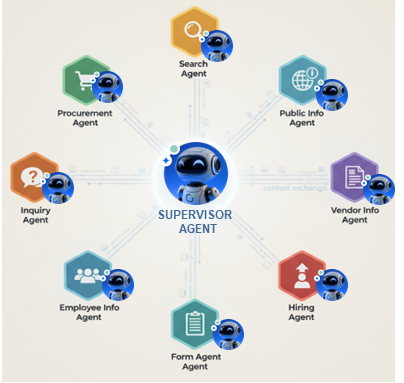Multi-Agent Supervision System
Our Multi-Agent Supervision System is redefining intelligent automation, ensuring every customer interaction is handled with optimal precision and expertise. Unlike traditional systems, our platform features a sophisticated supervisor agent that intelligently routes customer inquiries and contextual data to the most appropriate specialized agents. This seamless orchestration guarantees faster resolution times, personalized service, and a consistently superior customer experience, transforming your operational efficiency and boosting customer satisfaction.

What is a Multi-Agent System (MAS)?
A Multi-Agent System (MAS) is a computerized system composed of multiple interacting intelligent agents.
It's essentially a distributed approach to solving complex problems that would be difficult or impossible for a single, monolithic agent or system to handle.
- Multiple Agents: The system includes several agents, each capable of perceiving its environment, reasoning, and taking action independently.
- Interaction/Communication: Agents communicate and interact with each other, often exchanging data, knowledge, or context to achieve their goals.
- Specialization: Individual agents often have specialized knowledge, skills, or roles (e.g., a "Supervisor Agent," a "Routing Agent," or a "Sales Agent").
- Collective Goal: The agents work collaboratively to pursue a common goal for the overall system, even if each agent has its own local goals.
Why use Multi-Agent Systems?
Multi-Agent Systems (MAS) are used primarily because they are the most effective way to solve problems that are complex, distributed, or require dynamic real-time coordination. The core advantages are:
- Scalability & Modularity: MAS breaks down huge problems into small, manageable agents. It's easier to build, maintain, and scale the system by adding new agents.
- Speed & Efficiency: Agents operate in parallel across distributed environments, significantly increasing processing speed and overall throughput.
- Robustness & Resilience: Because intelligence is distributed, the system is highly fault-tolerant. If one agent fails, others can take over, ensuring continuous operation.
- Coherent Experience (Business Value): Specialized agents share context to guarantee a seamless, non-disjointed customer journey, which improves personalization and satisfaction.
Multi-Agent System vs. Single Agent vs. Rule-based Bot
- Rule-based Bot: Follows a fixed, linear set of "if-then" rules. It has no learning capacity and is rigid.
- Single Agent: Uses machine learning to achieve a specific, narrow goal. It can learn but lacks the complexity and scope for diverse tasks.
- Multi-Agent System (MAS): Features multiple specialized agents that collaborate and intelligently delegate tasks (often overseen by a supervisor agent). This approach manages complexity, handles specialized tasks, and delivers a superior, personalized experience.
How do multi-agent systems benefit marketers?
They enable hyper-personalization at scale by ensuring every customer query is routed to the most qualified agent (or system) for that specific topic. This results in faster resolution times, higher customer satisfaction (CSAT), and more effective conversions from service interactions.
What’s the main difference between multi-agent systems and traditional automation tools?
The main difference is specialization and delegation. Traditional automation is often centralized and linear. MAS, by contrast, use a distributed architecture where a supervisor agent intelligently routes and delegates tasks to diverse, specialized agents, making the overall system more adaptive and effective.
Where do multi-agent systems work best in marketing workflows?
MAS excel in any area requiring intelligent routing and personalized follow-up:
- Lead Qualification: Routing high-value leads to the sales agent immediately while handling basic queries with an info-bot.
- Customer Support: Directing technical issues to a "Troubleshooting Agent" and billing issues to a "Billing Agent."
- Personalized Upselling/Cross-selling: Triggering a specific product recommendation agent based on a customer's real-time interaction history.
Updated 4 months ago
